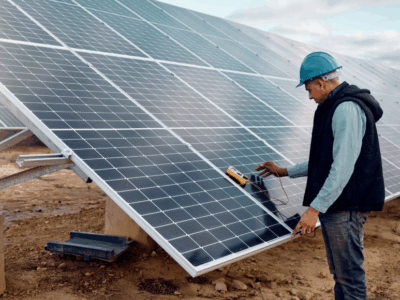“As a South Carolina-based solar company, Firefly Solar is proud to be part of our state’s growing clean energy economy. We’re hiring locally, building regional supply chains, and helping families and businesses take control of their energy costs. But the growth we—and so many others—are experiencing isn’t happening by accident. It’s happening because of smart, stable policy,” wrote Aaron Davis, founder and CEO of Piedmont-based FireFly Solar. “That’s why I’m urging Senators Lindsey Graham and Tim Scott to help protect the clean energy tax credits,” he stated in an op-ed recently published in the Anderson Observer.
Firefly Solar offers commercial and residential solar installations, in addition to helping South Carolinians deploy the likes of electric vehicle charging solutions, HVAC energy efficiency systems, and smart home technologies. “At Firefly Solar, we are investing in South Carolina’s future every day—through workforce development, infrastructure improvements, and expanding access to clean, reliable solar power,” Davis explained about the work conducted by his team of more than 30 people. “These are good jobs—stable, skilled work in installation, engineering, sales, and support—and they wouldn’t be possible without the federal tax credits that help make solar affordable and projects viable.”

Photo Courtesy Firefly Solar
Davis expanded on the importance of support for the clean energy industry at this point in time: “In the face of rising interest rates and higher material costs, these tax credits are the lifeline that keeps projects moving forward. They level the playing field, encourage private investment, and ensure companies like ours can continue to grow even as economic pressures increase.”
He added that a repeal of the credits would squander the state’s opportunity to be a leader in the clean energy industry, along with all the business and economic advantages that come along with such success, Davis argued: “South Carolina has a chance to be a national leader in clean energy. We have the sun, the talent, and the entrepreneurial spirit to make it happen.”
Repealing the credits would also be detrimental to South Carolinian businesses that depend on policy and regulatory certainty. “If lawmakers roll back those incentives now, then solar companies across South Carolina—and our employees—will feel the pain immediately… Businesses like ours need to plan years ahead to stay successful. When policies change unpredictably or incentives are cut short, it chills investment and slows down momentum we’ve worked hard to build,” Davis said. As of May, according to the E2 and the Clean Economy Tracker, factory and project cancellations nationally have totalled $15.5 billion since January, equating to nearly 12,000 lost jobs. More than $9 billion and 10,000 jobs had been set for Republican districts.
“Solar companies like Firefly—and others across the state—are ready to keep investing in South Carolina. We’re ready to hire more, build more, and power more communities across the state with more reliable, cleaner, and lower-cost energy. But we can’t do it without the long-term certainty that the IRA’s energy tax credits provide,” he emphasized.
Finally, Davis posited that the clean energy tax credits are important for the livelihoods of all South Carolinians. “They’re helping South Carolina homeowners lower their utility bills,” he noted about the comparatively lower cost of clean energy resources. “They’re giving small businesses new tools to manage costs, reduce energy consumption, and stay competitive,” he explained about the benefits for businesses like his. “And they’re powering a homegrown clean energy industry that’s putting people to work in every corner of the state.”

Photo Courtesy Firefly Solar
“I appreciate the leadership both Senators Graham and Scott have shown on economic development and job creation,” he concluded. Simultaneously, he urged Senators Graham and Scott to take a look around at the positive impact the industry has already had on the state: “South Carolina’s clean energy sector is growing stronger by the day, and federal tax policy—including the IRA’s energy tax credits—plays a big role in that success. Let’s keep it going.”
“These incentives are driving real investments, creating real jobs, and powering real economic growth right here in South Carolina,” Davis wrote. “Our senators and all of Congress must work to protect and preserve these clean energy provisions. Our workers, our businesses, and our future depend on it.”





